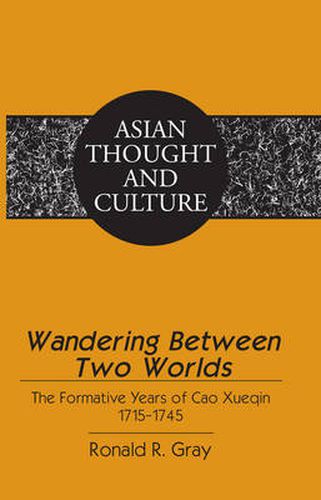Readings Newsletter
Become a Readings Member to make your shopping experience even easier.
Sign in or sign up for free!
You’re not far away from qualifying for FREE standard shipping within Australia
You’ve qualified for FREE standard shipping within Australia
The cart is loading…






This title is printed to order. This book may have been self-published. If so, we cannot guarantee the quality of the content. In the main most books will have gone through the editing process however some may not. We therefore suggest that you be aware of this before ordering this book. If in doubt check either the author or publisher’s details as we are unable to accept any returns unless they are faulty. Please contact us if you have any questions.
Wandering Between Two Worlds: The Formative Years of Cao Xueqin 1715-1745 is a biographical account of the first 30 years of the life of the eighteenth-century Chinese novelist who wrote Honglou meng (Dream of the Red Chamber). It covers Cao Xueqin’s life from his birth in Nanjing in 1715 to the time when it is roughly estimated he began to seriously write his massive work. The book attempts to provide a brisk but broad overview of the important familial, social, historical, literary, and intellectual influences on Cao and his decision to write Honglou meng. Wandering Between Two Worlds relies upon extensive interviews done with noted mainland Chinese scholars on the novel, such as Zhou Ruchang, Cai Yijiang, Duan Jiangli, Shen Zhijun, Zhang Qingshan, and Sun Yuming, during the author’s eight-year stay in China; recent research done by Western scholars on Qing dynasty literature, gender, qing, philosophy, and education; and insights from the burgeoning field of the New Qing history. This is only the second biography of Cao Xueqin’s life to appear in English, and the first to examine in detail his early life and to be written by a non-Chinese. It is intended for students of traditional Chinese literature and culture, as well as general readers interested in the novel and features a special foreword written by the distinguished redologist Zhou Ruchang.
$9.00 standard shipping within Australia
FREE standard shipping within Australia for orders over $100.00
Express & International shipping calculated at checkout
This title is printed to order. This book may have been self-published. If so, we cannot guarantee the quality of the content. In the main most books will have gone through the editing process however some may not. We therefore suggest that you be aware of this before ordering this book. If in doubt check either the author or publisher’s details as we are unable to accept any returns unless they are faulty. Please contact us if you have any questions.
Wandering Between Two Worlds: The Formative Years of Cao Xueqin 1715-1745 is a biographical account of the first 30 years of the life of the eighteenth-century Chinese novelist who wrote Honglou meng (Dream of the Red Chamber). It covers Cao Xueqin’s life from his birth in Nanjing in 1715 to the time when it is roughly estimated he began to seriously write his massive work. The book attempts to provide a brisk but broad overview of the important familial, social, historical, literary, and intellectual influences on Cao and his decision to write Honglou meng. Wandering Between Two Worlds relies upon extensive interviews done with noted mainland Chinese scholars on the novel, such as Zhou Ruchang, Cai Yijiang, Duan Jiangli, Shen Zhijun, Zhang Qingshan, and Sun Yuming, during the author’s eight-year stay in China; recent research done by Western scholars on Qing dynasty literature, gender, qing, philosophy, and education; and insights from the burgeoning field of the New Qing history. This is only the second biography of Cao Xueqin’s life to appear in English, and the first to examine in detail his early life and to be written by a non-Chinese. It is intended for students of traditional Chinese literature and culture, as well as general readers interested in the novel and features a special foreword written by the distinguished redologist Zhou Ruchang.